Dental Cleaning & Consultation
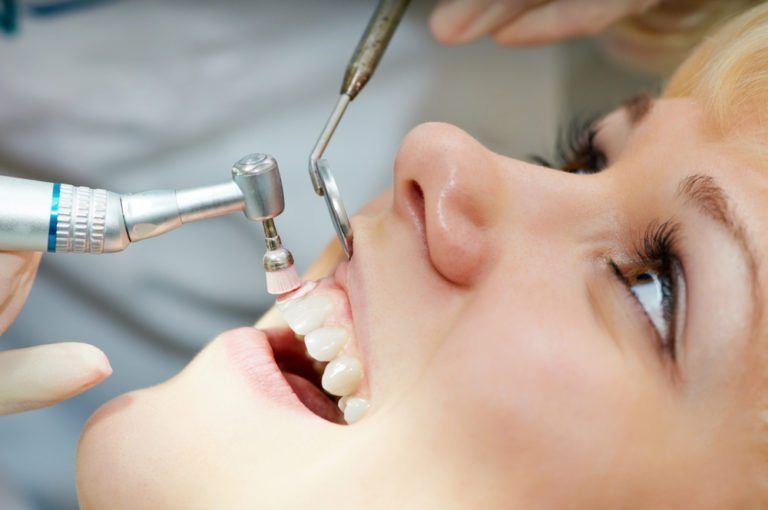
Regular dental cleanings & consultations are the foundation of dentistry and will make up the majority of your dental appointments at Appletree Dentistry. To maintain your oral health, the American Dental Association recommends visiting your Tigard dentist at least once every six months for a dental cleaning & consultation. This allows Dr. Simpson to closely monitor your oral health and identify any problems early on.
Did You Know?
Despite the many benefits of visiting a dentist twice a year, only about 61% of American adults under the age of 65 regularly visit their dentist. This number drops to 57% in Americans over the age of 65. However, it has been found that 79% percent of children ages 2-17 attend regular dental appointments. This suggests that the older one gets, the less likely they are to visit the dentist. However, your risk for developing tooth decay and gum disease stays the same no matter your age.
Frequently Asked Questions:
Am I a candidate for a dental cleaning & consultation?
Yes, everyone is a candidate for a dental cleaning and consultation. Preventative dental services, such as a dental cleaning and consultation, are beneficial because they will either maintain existing dental health or address dental health issues. It doesn’t matter what age you are or what your current level of dental health is; a dental cleaning and consultation will help you.
How often do I need to get a dental cleaning and consultation?
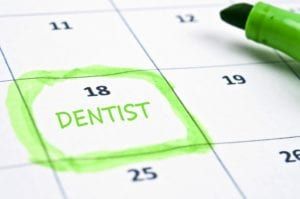
The American Dental Association recommends visiting Appletree Dentistry at least once every six months for your dental cleaning and consultation. However, depending on your medical and dental history, you may need more frequent visits. For example, if you have diabetes or are pregnant, Dr. Simpson may recommend you come in more often to monitor certain dental health issues that are associated with these medical conditions. This will be discussed during your initial consultation, so that you and Dr. Simpson can come up with a plan that works best for your unique dental needs.
How do I prepare for my dental consultation and cleaning?
The best way to prepare for your dental appointment at Appletree Dentistry is to consider what you want to discuss during your dental consultation. Some possible questions you can ask Dr. Simpson include:
-
- Why do my gums bleed?
-
- How can I improve my oral health?
- Am I using the correct brushing/flossing technique?
What should I expect during my dental cleaning and consultation at Appletree Dentistry?
During your dental cleaning and consultation appointment, you can expect that your appointment will be broken down into three parts: dental x-rays, a dental exam, and the dental cleaning.
Dental x-rays:
Dental x-rays are usually taken first so that they can be discussed during your consultation. There are two types of dental x-rays: intraoral and extraoral. Intraoral x-rays are the most commonly used x-rays because they offer a variety of angles that evaluate the inside of the mouth. For example, intraoral x-rays can obtain images of how your upper and bottom teeth line up, all your teeth in a single shot, a close up of your teeth from crown to root, and even the spaces between teeth. Extraoral x-rays, on the other hand, are generally only used to evaluate the jaw and only capture the bone structure outside of the mouth.
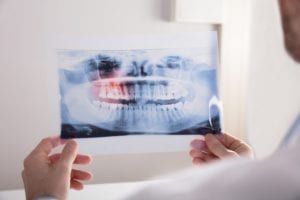
The process of getting dental x-rays is actually quite simple. For starters, you will need to remove anything that can interfere with the x-ray, such as: metal jewelry, glasses, or removable appliances. Our dental hygienist will then place a lead vest across your chest and lap to protect other areas of your body from radiation. It is important to note that dental x-rays only use a tiny amount of radiation, nevertheless it is important to minimize any additional radiation from being absorbed by the body. Once you are prepared for your dental x-rays, our hygienist may ask you to bite down on a plastic disc or hold your mouth open at different angles to obtain various images. It only takes seconds to obtain and process these images, and all your dental x-rays will be completed in a matter of minutes.
Dental exam:
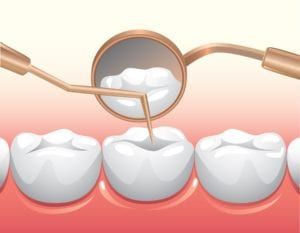
Once your dental x-rays have been completed, the next step is to undergo a dental exam. During your dental exam, Dr. Simpson will ask about your medical history, current medications, and if you have any dental concerns. Then, he will carefully and thoroughly evaluate your teeth, bite, gums, and surrounding soft tissues. To check your teeth, he may use a small metal tool to see if there are signs of decay on the surface of your teeth.
He will also measure the depth of your gum pockets to check for possible gum disease, and perform an oral cancer screening, which consists of a visual exam and possibly palpitating soft tissues for signs of tenderness. Depending on your symptoms, if any, he may also check your teeth for signs of sensitivity. Your dental exam should not hurt, however if your teeth are sensitive, you may experience some very minor discomfort.
During your dental exam, your dental x-rays will also be discussed. Often times, the symptoms you are having will line up with what the dental x-ray shows. In this case, Dr. Simpson will explain his findings and make treatment recommendations, if necessary. If everything looks normal, he will simply proceed to cleaning your teeth.
Teeth Cleaning:
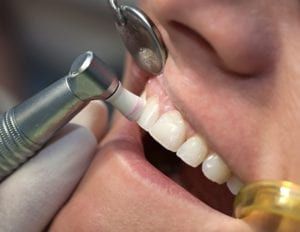
This is generally the final step during your appointment. During a professional teeth cleaning, a scaler is used to scrape off the plaque and tartar from your teeth. After the scaler is used to individually clean each tooth, a gritty toothpaste is brushed onto your teeth and rinsed with water to remove any remaining debris. Finally, a fluoride polish is applied to your teeth to protect from future decay.
Professional teeth cleanings are important because they remove the habitat the bacteria thrive in. When plaque and tartar build up on your teeth, this provides bacteria with a food source and can encourage them to grow. The more bacteria you have in your mouth, the higher your risk for developing tooth decay and gum disease. Regular dental cleanings ensure that the bacteria levels in your mouth remain lower and decrease your risk for developing dental cavities and gum disease.
For simply great dental care, schedule a consultation with your Tigard dentist, Dr. Scott T. Simpson of Appletree Dentistry today!


